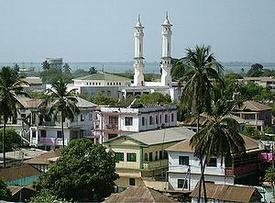African Mayors Agree to Combat Climate Change
NAIROBI, Kenya, March 2, 2009 (ENS) - Mayors from 33 capital and major cities across Africa pledged Friday to quicken climate change adaptation and mitigation plans for their cities.
Concluding a two-day meeting in Nairobi, the mayors issued the Nairobi Declaration, in which they resolved to integrate these plans into city development strategies.
Despite their relatively low contribution to global warming, African cities are suffering the effects of rising greenhouse gas emissions elsewhere in the world, mayors said at the conference, which was organized by UN-HABITAT to discuss the regional and global roles of mayors.
UN-HABITAT Executive Director Anna Tibaijuka said the regional conference had provided a new impetus to the local government movement in Africa.
 |
Tanzania's largest city Dar es Salaam is located on the Indian Ocean. (Photo credit unknown) |
"I am comforted that this conference has not been yet another forum for making laudable proclamations," she said. "The outcome is a realistic call for collective action."
The mayors resolved to raise the voice of African cities by participating actively in the ongoing global climate change policy development process that will culminate in the UN Climate Change Conference in Copenhagen in December. There, governments are expected to agree on a greenhouse gas limitation treaty that will take effect at the end of 2012 when the Kyoto Protocol's first commitment period expires.
Adam Kimbisa, the mayor of Tanzania's capital, Dar es Salaam, observed that a continent that contributes relatively little to climate change is suffering severely because of it.
"Climate change did not start yesterday, and not in Africa. It started years ago, somewhere else," said Kimbisa, in reference to Europe's 18th century Industrial Revolution.
Concern over climate change was expressed most vocally by the mayors of coastal cities such as Dar es Salaam, Moroni and Banjul, and small island states such as Comoros and Seychelles.
 |
Banjul, capital city of The Gambia, is built on the Atlantic Ocean. (Photo by Robert Mondmann) |
Marie-Antoinette Alexis, the mayor of Seychelles capital Victoria, said, "All countries must work together to combat climate change. In the Seychelles, our 116 islands are on the front line. We can lose our beaches, our tourism, our land and our way of life, if something is not done quickly."
Samba Faal, the mayor of Banjul, capital of Gambia, observed that a one meter (39 inch) rise in sea level near his city would result in a 50 percent loss in landmass. Since most of Banjul lies one meter below sea level, such a scenario would pose a serious threat to human settlements, health and food security
Still, the negative impact of climate change is not confined to seaside cities. Mahamat Zène Bada, the mayor of Chad's capital N'djamena, noted that irregular rainfall patterns and deforestation in and around the city had led to major flooding in 1999, 2001 and 2008. The city is flanked by two rivers and most people rely on wood products for energy, which causes the deforestation.
Climate change is only one of many problems afflicting African cities, emphasized Mayor Kimbisa. "Our cities cannot cope with five to six percent population growth. We can't cope in education, housing, health or water," he said. "Our cities are overwhelmed."
Copyright Environment News Service (ENS) 2009. All rights reserved.
To subscribe or visit go to: http://www.ens-newswire.com